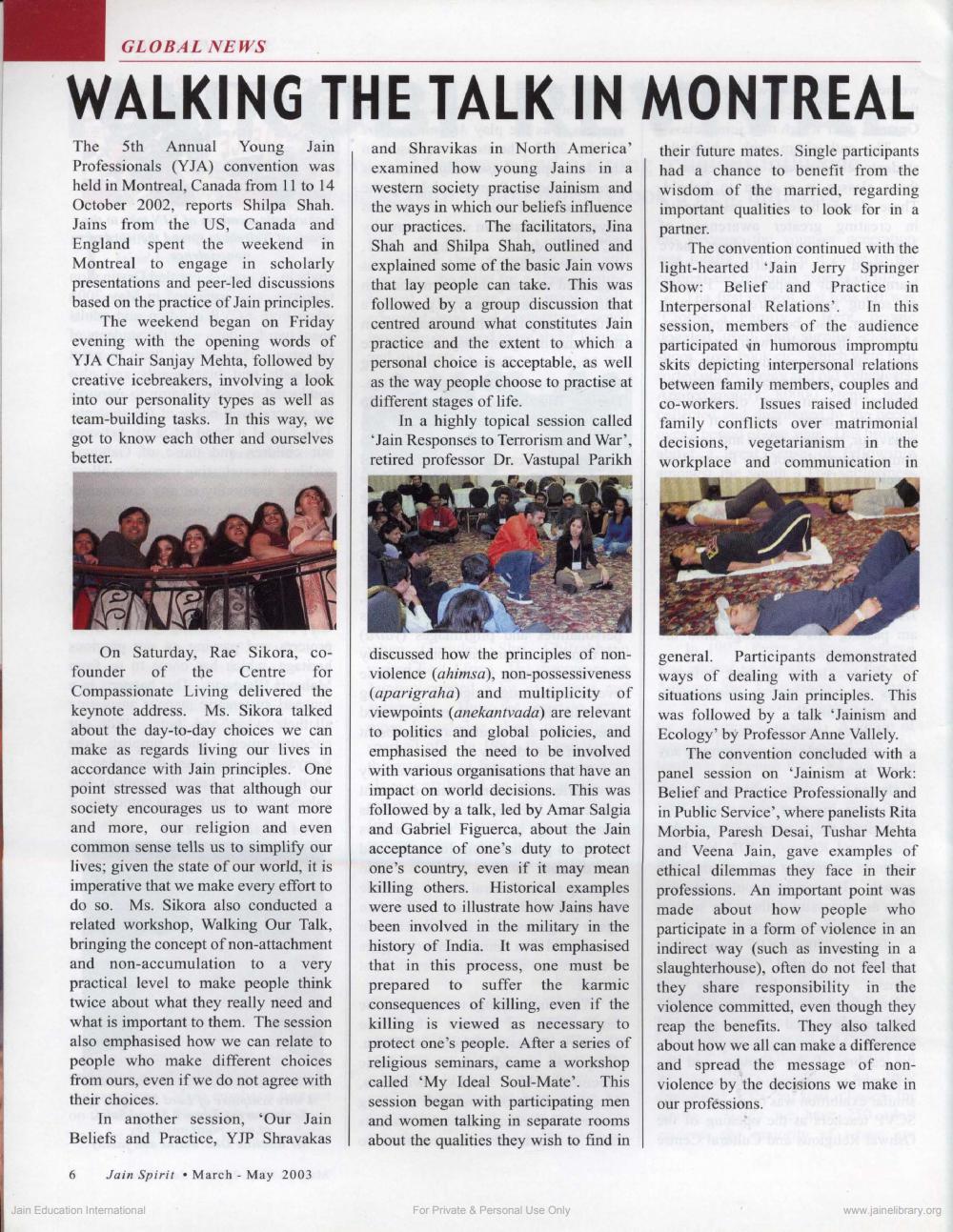Book Title: Jain Spirit 2003 03 No 14 Author(s): Jain Spirit UK Publisher: UK Young Jains View full book textPage 9
________________ GLOBAL NEWS WALKING THE TALK IN MONTREAL The 5th Annual Young Jain Professionals (YJA) convention was held in Montreal, Canada from 11 to 14 October 2002, reports Shilpa Shah. Jains from the US, Canada and England spent the weekend in Montreal to engage in scholarly presentations and peer-led discussions based on the practice of Jain principles. The weekend began on Friday evening with the opening words of YJA Chair Sanjay Mehta, followed by creative icebreakers, involving a look into our personality types as well as team-building tasks. In this way, we got to know each other and ourselves better. and Shravikas in North America' examined how young Jains in a western society practise Jainism and the ways in which our beliefs influence our practices. The facilitators, Jina Shah and Shilpa Shah, outlined and explained some of the basic Jain vows that lay people can take. This was followed by a group discussion that centred around what constitutes Jain practice and the extent to which a personal choice is acceptable, as well as the way people choose to practise at different stages of life. In a highly topical session called *Jain Responses to Terrorism and War', retired professor Dr. Vastupal Parikh their future mates. Single participants had a chance to benefit from the wisdom of the married, regarding important qualities to look for in a partner. The convention continued with the light-hearted 'Jain Jerry Springer Show: Belief and Practice in Interpersonal Relations. In this session, members of the audience participated in humorous impromptu skits depicting interpersonal relations between family members, couples and co-workers. Issues raised included family conflicts over matrimonial decisions, vegetarianism in the workplace and communication in On Saturday, Rae Sikora, COfounder of the Centre for Compassionate Living delivered the keynote address. Ms. Sikora talked about the day-to-day choices we can make as regards living our lives in accordance with Jain principles. One point stressed was that although our society encourages us to want more and more, our religion and even common sense tells us to simplify our lives; given the state of our world, it is imperative that we make every effort to do so. Ms. Sikora also conducted a related workshop, Walking Our Talk, bringing the concept of non-attachment and non-accumulation to a very practical level to make people think twice about what they really need and what is important to them. The session also emphasised how we can relate to people who make different choices from ours, even if we do not agree with their choices In another session, 'Our Jain Beliefs and Practice, YJP Shravakas discussed how the principles of nonviolence (ahimsa), non-possessiveness (aparigraha) and multiplicity of viewpoints (anekantvada) are relevant to politics and global policies, and emphasised the need to be involved with various organisations that have an impact on world decisions. This was followed by a talk, led by Amar Salgia and Gabriel Figuerca, about the Jain acceptance of one's duty to protect one's country, even if it may mean killing others. Historical examples were used to illustrate how Jains have been involved in the military in the history of India. It was emphasised that in this process, one must be prepared to suffer the karmic consequences of killing, even if the killing is viewed as necessary to protect one's people. After a series of religious seminars, came a workshop called 'My Ideal Soul-Mate'. This session began with participating men and women talking in separate rooms about the qualities they wish to find in general. Participants demonstrated ways of dealing with a variety of situations using Jain principles. This was followed by a talk 'Jainism and Ecology' by Professor Anne Vallely. The convention concluded with a panel session on Jainism at Work: Belief and Practice Professionally and in Public Service', where panelists Rita Morbia, Paresh Desai, Tushar Mehta and Veena Jain, gave examples of ethical dilemmas they face in their professions. An important point was made about how people who participate in a form of violence in an indirect way (such as investing in a slaughterhouse), often do not feel that they share responsibility in the violence committed, even though they reap the benefits. They also talked about how we all can make a difference and spread the message of nonviolence by the decisions we make in our professions. 6 Jain Spirit . March - May 2003 Jain Education International For Private & Personal Use Only www.jainelibrary.orgPage Navigation
1 ... 7 8 9 10 11 12 13 14 15 16 17 18 19 20 21 22 23 24 25 26 27 28 29 30 31 32 33 34 35 36 37 38 39 40 41 42 43 44 45 46 47 48 49 50 51 52 53 54 55 56 57 58 59 60 61 62 63 64 65 66 67 68
